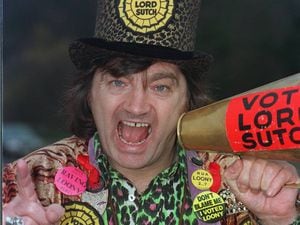Political Column – November 1
After the West End performance of Grey Phil And The Magic Money Tree the other day, we got to the really interesting bit of the Budget.
That comes a couple of days or so after the Chancellor has strutted his stuff
By that time everybody has started to untangle the language of GDP, OBR, and so on, as well as all those economic forecasts which are so consistently wrong that it is a wonder that anybody takes them at all seriously.
They have had an opportunity to get out their abacus and run the Chancellor's figures through them.
At that stage it becomes a little bit clearer whether those figures actually add up. It is also an opportunity to evade the misdirection of Grey Phil and look at the things that he didn't make any play of as he tried, with some success, to bore the Commons to death.
Very much under the spotlight at the moment is the A word.
We are moving towards an end of austerity, according to Grey Phil. Theresa, you will remember, also promised an end to austerity at the Tories' party conference.
What did Jeremy think?
We all know the answer to that one. It was his theme at Prime Minister's Questions. He started with one of those googlies, giving an analysis of the Budget, saying certain groups (prison governors, council chief executives, head teachers) would struggle to find much to celebrate in it, and asking Mrs May if she agreed.
To the suspicious, it sounded as if these were not his words, but that he was quoting somebody else. A trap, then.
Who was he quoting? The CBI? The IMF? Boris?
None of the above. It turned out to be the Institute of Fiscal Studies, which has earned the common prefix "respected" – but only on those occasions when you agree with what it is saying.
Theresa May wasn't falling for it anyway. She said there was more money for schools and prisons. Austerity was indeed ending, she asserted.
Mr Corbyn: "The Prime Minister promised that austerity is over. The reality is that it was a broken promise Budget and she knows it."
Two can play at the game of quoting somebody else. The 1970s Labour Prime Minister Jim Callaghan once quoted a passage at PMQs, and was rewarded by jeers and derision from Tory backbenchers – before he revealed he was reading from the Tory manifesto. Incredibly he managed to do it several times with the same result.
In looking for words of support for the Budget yesterday, the Prime Minister did not hide the unlikely source, in the form of John McDonnell, the shadow chancellor, who has said Labour will not oppose Grey Phil's tax cuts for middle earners.
This is more evidence that something is going wrong with Comrade John. Only the other week he was ruling out a second Brexit referendum, before colleagues slapped him down. In modern politics, saying what you actually think means you're going seriously off script.
One thing Jezza said did seem to hit home and rile the PM. She had, he said, once claimed to be concerned about burning injustices. That concern had fizzled out, he charged. Her answer was to list things she had done, ranging from the Modern Slavery Act to the race disparity audit.
"Support for public services." "Up!" she said, with Tory backbenchers joining in chorus. "Growth." "Up!" came the backbench chorus again. "Wages." "Up!" "Debt." One poor soul jumped the gun with an "up!" before Mrs May continued: "...is falling."
Tory Brexiteer Peter Bone said he thought Grey Phil was a "bit iffy" about Brexit.
"How wrong I was."
Apparently the Budget has changed his view so much that Mr Bone thinks the Chancellor could be "the king of Brexit."
Mmm... Mr Hammond looked as if the crown would sit rather uneasily on his head.
It was incidentally the last PMQs before the coming commemoration of the centenary of the Armistice, and the Prime Minister was wearing a ceramic poppy which she said had been created by a school in the north west.
The chances of this commemoration of peace being accompanied by peace in the Commons chamber are of course nil, but then the freedom to disagree and debate is a cherished legacy of those whose names are recorded on war memorials up and down the land.





